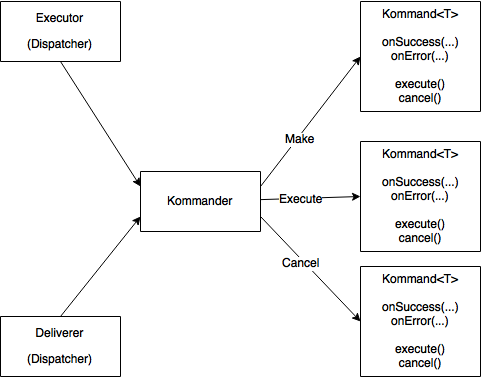
Kommander is a Swift library to manage the task execution in different threads. Through the definition a simple but powerful concept, Kommand.
Inspired on the Java library Kommander from Wokdsem.

🌟 Features
- [x] Make kommand or multiple kommands
- [x] Execute kommand or multiple kommands
- [x] Cancel kommand or multiple kommands
- [x] Retry kommand or multiple kommands
- [x] Set kommand success closure
- [x] Set kommand error closure
- [x] Set kommand error closure specifying Error type
- [x] Main thread dispatcher
- [x] Current thread dispatcher
- [x] Custom OperationQueue dispatcher
- [x] Execute single or multiple Operation
- [x] Execute sequential or concurrent closures
- [x] Execute DispatchWorkItem
- [x] Kommand state
- [x] iOS compatible
- [x] watchOS compatible
- [x] tvOS compatible
- [x] macOS compatible
- [x] Swift 4 version
- [x] Swift 3 version
- [x] Swift 2 version
- [x] Objective-C version
📲 Installation
Kommander is available through CocoaPods. To install it, simply add the following line to your Podfile:
pod 'Kommander'
For Swift 3 compatibility use:
pod 'Kommander', '~> 0.7'
For Swift 2 compatibility use:
pod 'Kommander', :git => 'https://github.com/intelygenz/Kommander-iOS.git', :tag => '0.3.0-swift2'
For Objective-C compatibility use:
pod 'Kommander', :git => 'https://github.com/intelygenz/Kommander-iOS.git', :tag => '0.2.3-objc'
Or you can install it with Carthage:
github "intelygenz/Kommander-iOS"
Or install it with Swift Package Manager:
dependencies: [
.package(url: "https://github.com/intelygenz/Kommander-iOS.git")
]
🐒 Usage
Making, executing, cancelling and retrying Kommands:
Kommander().make {
// Your code here
}.execute()
Kommander().make {
// Your code here
}.execute(after: .seconds(2))
Kommander().make {
return "Your string"
}.success { yourString in
print(yourString)
}.execute()
Kommander().make {
throw CocoaError(.featureUnsupported)
}.error { error in
print(String(describing: error!))
}.execute()
Specify Error type:
Kommander().make {
throw MyError.error
}.error(MyError.self) { error in
// error is MyError type.
}.execute()
Retry after cancellation:
let kommand = Kommander().make { () -> Any? in
// Your code here
}.success { result in
// Your success handling here
}.error { error in
// Your error handling here
}.execute()
kommand.cancel()
kommand.retry()
Retry after failure:
let kommand = Kommander().make { () -> Any? in
// Your code here
}.error { error in
// Your error handling here
}.retry { error, executionCount in
return executionCount < 2
}.execute()
Creating Kommanders:
Kommander(deliverer: Dispatcher = .current, executor: Dispatcher = .default)
Kommander(deliverer: Dispatcher = .current, name: String, qos: QualityOfService = .default, maxConcurrentOperations: Int = .default)
Shortcuts:
Kommander.main
Kommander.current
Kommander.default
Kommander.userInteractive
Kommander.userInitiated
Kommander.utility
Kommander.background
Creating Dispatchers:
CurrentDispatcher()
MainDispatcher()
Dispatcher(name: String, qos: QualityOfService = .default, maxConcurrentOperations: Int = .default)
Shortcuts:
Dispatcher.main
Dispatcher.current
Dispatcher.default
Dispatcher.userInteractive
Dispatcher.userInitiated
Dispatcher.utility
Dispatcher.background
❤️ Etc.
- Contributions are very welcome.
- Attribution is appreciated (let’s spread the word!), but not mandatory.
👨💻 Authors
alexruperez, alejandro.ruperez@intelygenz.com
juantrias, juan.trias@intelygenz.com
RobertoEstrada, roberto.estrada@intelygenz.com
👮♂️ License
Kommander is available under the MIT license. See the LICENSE file for more info.
 View on GitHub
View on GitHub Install in Dash
Install in Dash Kommander Reference
Kommander Reference








